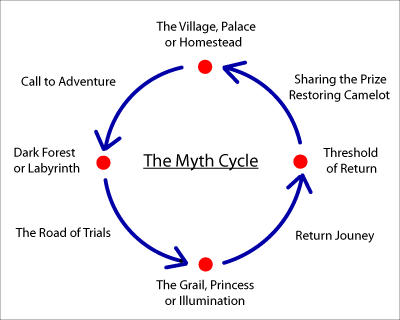First, check out abebooks.com for $1 books.
Second, before you read more literature,
read up on mythic structure. This diagram is extremely important in understanding a lot of literature theory. Many like Joseph Campbell posit that there is only
one story, the monomyth, and all stories are this monomyth saying the same thing in another way. Hence, why fairy tales are beloved across generations--Twilight and Harry Potter are just the same song in a different tune. The concrete adventures that hero(ine)s go on are
macguffins for human psychological development.
It is a little more in-depth than one assumes, and brings in Jung and Freud. It's worth reading that link, which from skimming seems similar to what I learned in lecture.
Postmodern books satirize these motifs and critique the notion of any meaningful story (i.e. are very nihilistic). Postmodern books will usually very intentionally avoid any sort of plot and get down to a micronarrative which has symbolic worth--the nihilistic belief that there is no meaningful quest or story.
I'm no lit expert, but my recs:
1. Kurt Vonnegut's
Slaughterhouse Five. It's an excellent book that I loved at 13 and 23. Has time traveling, but is more about critiquing war and exploring nihilism, human value and meaning.
2. Antoine de Saint-Exupery's
The Little Prince--its worth is obvious (for an Ne dom) when you read it. Bonus: it's a very short read, with philosophical stick drawings (no joke).
Somerset Maugham & Russell Banks are beautiful writers, though I have never "studied" them and can't explain why very well.
3. Hunter S. Thompson's
Fear & Loathing in Las Vegas, which is important b/c it's perhaps the ultimate postmodern novel. Must read up on Joseph Campbell's monomyth (Wikipedia would suffice, I'm sure) to understand HST's critique of it. Though Thompson was drugged up he was also carefully crafting a postmodern novel and like most literature it's best to assume that a concrete event stands in for larger meaning.
e.g. something in the novel "burns down 3 years ago" which was when Nixon got elected and, in his view, put the last nail in the coffin of American civilization. Similarly because it is a postmodern book the closer the protagonist gets to "the story" he as a journalist is trying to get, the more literal and figurative dust is kicked up and the more he is confused and unable to "see". It's all about perception and truth and meaning, or more precisely, the lack thereof.
"Uppers" in drug culture refer to '60s belief that drugs will open the doors and set you free (think Aldous Huxley's book
The Doors of Perception, which is where the Jim Morrison band got its name from). "Downers" are postmodern and recognize the "fact" that there is no ultimate truth so people drug themselves to deal with it. Ties a lot to American politics and if you're not read up in the monomyth you'll miss a lot of what Thompson is critiquing. Knowing the drug symbolism of uppers and downers will make you feel literary-style smart as you go through F&LinLV. They are failed questers, failing at each of the points in the cycle above (and instead of having a sacred marriage like, say, Odysseus, he fools around with a prostitute--but fails to even consummate that, which would start the individuals on the path to meaningful human psychological development).
4.
The Odyssey, by Homer. If you read it, get the one translated by Albert Cook, because it is the only literal translation showing oral culture's "memory chunking" into a metered rhythmic song. It's important because it shows a completely different reality from a literate culture! Homer was a bard from an illiterate society, so he and his people remembered by meter and repetition. The basic thing you learn here, after hearing phrases like the "rosy-fingered dawn" over and over and over and over and over again without the linguistic nuance one would expect from a literate culture (and the nuance that is injected into other nonliteral translations): oral memory is waayyy different and more fluid an interpretation than literate memory. It can't be any other way.
This is important for interpreting historical "facts" that were passed down through oral culture for generations before they were written down. Read scholar & priest Walter J. Ong's
Orality and Literacy. It blew my mind and convinced me that the Genesis story should only be interpreted in the context in which it is written--an oral culture's story should not be held to the same literal standard as a literate culture's story (which does
not mean it doesn't have value and meaning, but that it is different than our understanding of pure truth). I especially liked this in light of neuroscience and language learning.
PM if you're interested in having me type up class notes because I could go on for a while.





